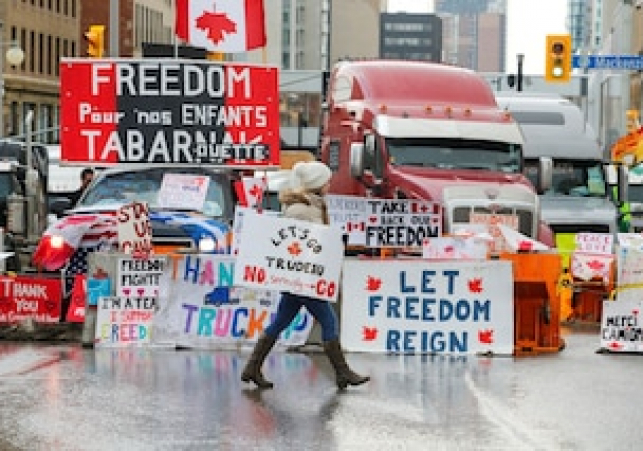

Premier Doug Ford of Canada’s Ontario province announced a state of emergency on Friday, citing continued trucker protests against COVID rules.
“I will summon Cabinet to employ legal authorities to urgently pass orders that make crystal clear that blocking and obstructing the movement of goods, people, and services along key infrastructure is illegal and punished,” Ford stated during a press conference.
Ford also promised further legal action against demonstrators, including fines and possible prison terms for disobeying government orders.
Hundreds of truck drivers have been blocking the Ambassador Bridge connecting Windsor and Detroit since Monday, protesting Canada’s COVID-19 limitations and screaming against Prime Minister Justin Trudeau. Over the last two weeks, hundreds of others have paralyzed downtown Ottawa.
Premier Doug Ford has announced that the provincial cabinet would meet on Saturday to issue directives making it “very clear” that blocking key infrastructure is unlawful.
The siege of Ottawa has now lasted two weeks, according to Ford. “It’s a prohibited occupation.” It’s no longer a demonstration.” Separately, Windsor’s mayor planned to file an injunction on Friday afternoon to try to break up the bridge roadblock, as parts shortages triggered by the protest spread across the car industry on both sides of the border.
Federal, provincial, and local authorities have been hesitant to evict the self-declared Freedom Convoy demonstrators there and elsewhere around the country, owing to a shortage of personnel among local cops, Canada’s regard for free expression, and fear of a violent backlash. Some truckers are “ready to die,” according to Windsor Mayor Drew Dilkens, who issued a warning earlier this week.
However, pressure to reopen the bridge appeared to be building, with automakers Ford, GM, Toyota, and Honda halting operations or cancelling shifts due to component shortages, and the Biden administration pressing Trudeau’s government to utilise federal authorities to lift the blockade. The governor of Michigan has also urged Canadian officials to end the impasse as soon as possible.
The Ambassador Bridge is the busiest border crossing between the United States and Canada, carrying 25% of all trade between the two countries. The conflict comes at a time when the auto industry is already struggling to keep up with demand because to pandemic-related computer chip shortages and other supply-chain bottlenecks.
Nelson Wiseman, a political science professor at the University of Toronto, remarked, “American politicians are freaking out, and understandably so.” “The White House is now putting pressure on Trudeau to act more decisively.” In addition to the gridlocked Ottawa, protesters have shut down three border crossings: Windsor, Coutts, Alberta, on the border with Montana, and Emerson, Manitoba, on the border with North Dakota.
On Friday, police in Windsor and Ottawa expected reinforcements from the Royal Canadian Mounted Police, the federal police agency, amid hints that officials were poised to step up their efforts.
The mayor of Ottawa has requested 1,800 additional police officers, virtually tripling the city’s police force’s current personnel of 2,100 officers and civilians.
Disagreements over who is in command have also marred the response to the protests. This week, Canada’s disaster preparedness minister stated that Ontario had ultimate responsibility, while the province’s transportation minister stated that it is the federal government’s job.
After a week of the Ottawa standoff, Wiseman believes the Canadian army should have been brought in.
“Federal authorities’ hesitancy to act decisively has inspired occupiers and copycat occupations,” says the report “he stated “I believe Ottawa will be forced to use the troops.” The Canadian demonstrators are shouting against Trudeau for mandating vaccines for truckers and other COVID-19 restrictions, despite the fact that many of the country’s infection controls are already being eased as the omicron surge subsides.
After protest organizers utilized GoFundMe to raise around $10 million Canadian dollars ($7.8 million), Canadian officials had GoFundMe cut off donations. Because of illegal behaviour, GoFundMe found that the fundraising attempt violated the site’s terms of service.